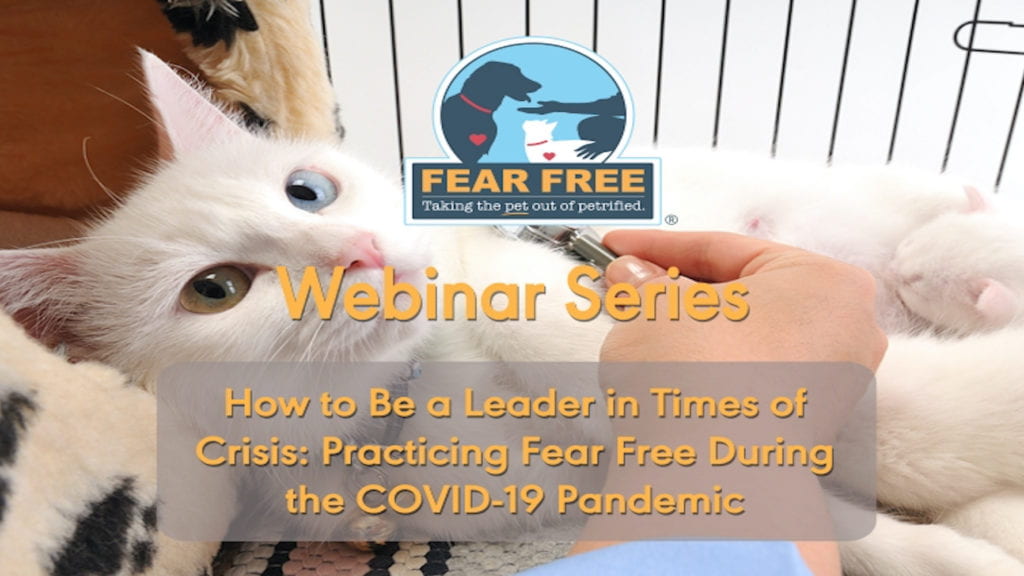How to Be a Leader in Times of Crisis: Practicing Fear Free veterinary medicine during the COVID-19 Pandemic
 Being a leader comes naturally to some and is a challenge to others. However, the true test of a leader is how well they function in
Being a leader comes naturally to some and is a challenge to others. However, the true test of a leader is how well they function in
a crisis. Today, we find ourselves in the thick of a crisis caused by COVID-19. Everyone has the potential to be a leader by being aware of and utilizing key traits of good leadership. Fear Free Pets is an organization on a mission to alleviate fear, anxiety and stress in pets and educate and inspire the people that care for them. Here are the highlights of a Fear Free Pets webinar, How to Be a Leader in Times of Crisis: Practicing Fear Free During the COVID-19 Pandemic, which focuses on what it takes to be a good leader, especially in this time of crisis.
Communication is the most important skill any leader can possess
- Regardless of the situation, honesty, transparency, and openness are cornerstones of being a successful leader. This means maintaining transparency, even in the face of bad news, is essential.
Be a source of information
- A good leader is armed with current and correct information that they are able to disseminate to others. The CDC, WHO-Daily Situation Report, and AVMA daily briefs all provide reliable and up-to-date information.
Be flexible and recognize challenges
- Being flexible helps you and your team adapt to a changing environment.
- Create short-term plans and recognize the challenges the plan may pose. Creating short-term plans allows people to know what they are supposed to be doing and gives them a sense of control and “normalcy” in the workplace. It is okay if these plans change, because the change is already expected.
- Recognize the challenges that occur as you work to put your plan into effect. The need to socially distance can be especially problematic for teams. This is overcome by splitting staff into teams, changing work flow patterns, and altering client interactions.
- Consider the financial challenges that come with having to drastically alter day-to-day business and plan for them.
Prioritize the health and safety of the team
- The health and safety of the team should always be priority. This could involve difficult decisions, such as closing your clinic or reducing caseload. It also involves ensuring those who are working have proper PPE and feel safe while in the workplace.
- Team health also includes attention to mental health. The psychological well-being of your team members should be closely monitored during this crisis. While some adapt easily to change, others may find it overwhelming. Veterinary medicine is already a challenging profession. Drastic changes to daily operations can be taxing on an already vulnerable population.
- Several mental health care resources for veterinary professionals exist: AAHA Culture Initiative, AVMA Workplace Well-being Certificate, E-counseling.com, Vets4Vets, VIN Foundation Student Debt Center, and VHMA Employee Assistance Program .
- For practices in NYS, the NYSVMS offers a 24/7 counseling service for veterinary practice staff.
- A leader must also pay attention to their own well-being. Taking on every single challenge is too much for one person. A good leader delegates tasks and utilizes their “village” to make it through a crisis.
Address the challenges of practicing fear free medicine in the face of COVID-19
- This pandemic has caused people to have increased fear, anxiety and stress, for us as humans. We need to remember that it can also be creating increased fear, anxiety, and stress in our pets. COVID-19 requires us to change the way fear free medicine is practiced. This is a challenging but not impossible task.
- Now more than ever, it is important to listen to clients and work with them to help alleviate fear, anxiety, and stress in their pets in new and creative ways.
Lastly, good leaders do not have to know everything and that is okay!
Want to learn more? Check out the recording of Fear Free Pets webinar, How to Be a Leader in Times of Crisis: Practicing Fear Free During the COVID-19 Pandemic, by clicking here.

